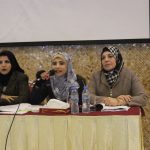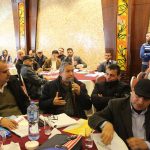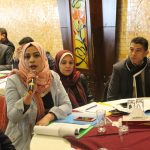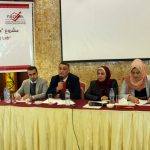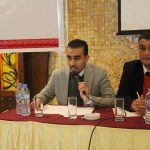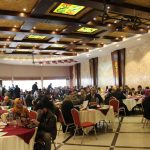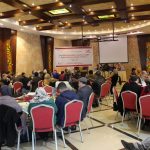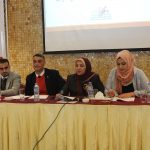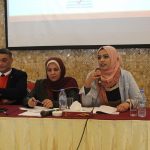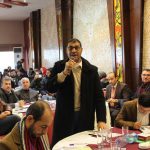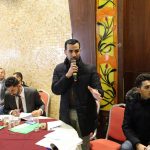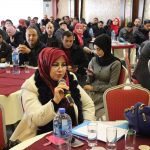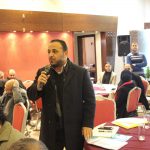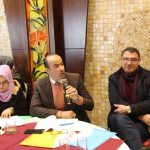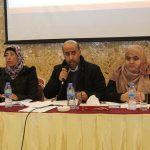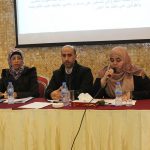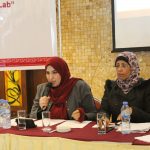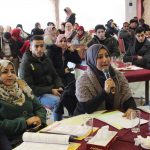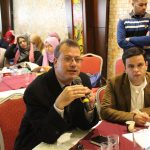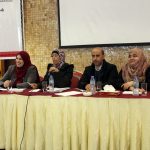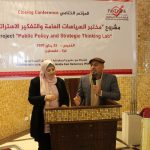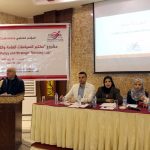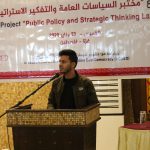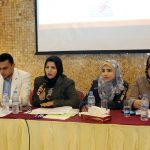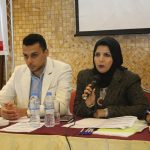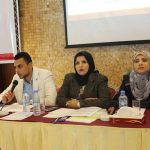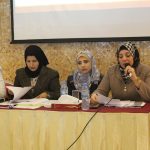In partnership with the “POMED Middle East Democracy Project”, Pal-think has organized a closing conference in conclusion of project “Public Policy Laboratory and Strategic Thinking”. Ten policy papers, dealing with important societal issues such as the electricity problem, solid waste management, and economic violence against women, were discussed as part of Pal-think’s efforts in localizing community development and empowering youth research.
“In addition to enhancing the research capabilities and communal involvement of young Palestinians, the localization of community development, and enabling Palestinian youth to participate actively in community development, this program and many others implemented by the Pal-think, a Think Tank Organization, also aim to narrow the gap between higher education and the labor market” opening statement, Pal-think director and founder, Mr. Omar Shaban.
“Today, after a painstaking seven-month-long effort, ten research papers, produced by a team of trainees and supervisors: Ms. Heba Al-danaf and Mr. Yahya Al-qaoud, will be presented before you”
The conference focused on three messages, namely, that “the Palestinian youth is indeed capable of actively and effectively contributing to the development process”, “the Palestinian youth is indeed capable of scientific thinking and writing”, “the necessity of localizing community development”
During the first session, moderated by political science professor Dr. Abeer Thabet, researcher Khaled Abu-jamea presented his paper, entitled “Towards Effective Policies to Address the Electricity Crisis in the Gaza Strip”, in which he promptly discussed the problem of electricity in the Gaza Strip and reviewed procedures taken by the Energy Authority in attempt to face this Electricity Crisis.
Abu-jamea highlighted the Qatari proposal, which aims to replace fuel for gas via a pipeline that runs from Israel.
Abu-jamea’s paper also presented an evaluation for three policy alternatives to solve the crisis, namely: importing additional quantities of fuel under pressure from the responsible authorities, forming an independent body to ensure the implementation of electrical improvement understandings, investing community-based initiatives seeking to improve and support electricity.
As for Ola Hillis, another trained researcher, she presented a paper entitled “Treatment and management of solid waste in the Gaza Strip”, examining the problem of solid waste– which represents half of all Gaza waste–, the reasons for the aggravation of the problem, and it’s health effects on the environment, plants, and people.
She talked about the types of solid waste in the sector, and ways to treat it. Three alternatives were presented and evaluated.
Researcher Layali Abu Mahdi also presented a paper entitled “Policies to Reduce Economic Violence Against Women in the Gaza Strip”, examining the problem of economic violence against women, and explaining the causes of economic violence against women and its indicators in the Gaza Strip.
Three alternatives were proposed and examined: Policies made specifically to eliminate sexual discrimination within the Palestinian judiciary– ensuring that the necessary measures are taken that lead to economic empowerment of women–, a feminist action plan to confront economic violence, and encouraging women to control their economic assets.
Together, researchers Kamal Dalloul and Dua Doghmash presented a paper, titled “Treating seawater pollution with wastewater”, discussing the problem of sea water pollution and its implications regarding fisheries, aquatic health and environment, and tourism. They reviewed the viability of wastewater treatment plants as a solution, and gave constructive criticism on the Environmental Quality Authority policy towards wastewater pollution.
Their paper presented three alternatives, namely: to treat or refine wastewater instead of discharging it into the sea, restoration and repair of infrastructure, exporting of wastewater to dispose of it.
During the second session, conducted by researcher and the economic specialist, Dr. Raed Al-Hill, and researcher Youssef Al-Haddad, a paper entitled “Effective Policies for Reforming the Judicial System in Palestine” was presented, which examined the judiciary in Palestine, the impact of the division on it, and concerns about its accountability. The paper examined problems arisen by the existence of two separate judicial authorities; one in the West Bank, and one in the Gaza Strip.
Three alternatives were proposed and examined: unifying and neutralizing the Palestinian judiciary, enhancing the independence of the judiciary in light of the Palestinian division, developing and reforming the judiciary.
Ola Hillis, once again, in partnership with Walaa Al-hayek presented a paper titled “Policies to Activate Teleworking and Reduce Unemployment in the Gaza Strip”, discussing the problem of unemployment in the Gaza Strip and the potential of self-employment to provide job opportunities for youth.
The paper reviewed the viability of self-employment and its challenges in Palestine, especially in Gaza. And presented encouraging cases of Palestinian successes with self-employment.
Two policy suggestions were proposed: to strengthen and develop capabilities of students and graduates specific to the remote job market, and to develop the Palestine-specific remote job market.
Researcher Hala Abu Abdo also presented a paper entitled “Activating Student Council Elections in the Universities of the Gaza Strip”, which discussed the problem of ending student council elections in the universities of the Gaza Strip, and its effect on students and society as a whole.
Three alternatives were proposed and examined: holding student council elections in the Gaza Strip, neutralizing student council elections from the division, and updating the electoral system for student councils.
During the third session moderated by Professor of Public International law, Dr. Samia Al-Ghoussein, researchers Bilal Al-Shaer and Hala Abu Abdo presented a paper entitled “Policies to Promote the Rehabilitation Sector in the Application of Protection Standards within the Human Response of Persons with Disabilities in the Gaza Strip”, discussing the failure of rehabilitation institutions in the Gaza Strip in applying protection standards for persons with disabilities who suffer from societal and political marginalization.
The paper shed light on the protection provided by the humanitarian response plan for the Gaza Strip, the disabled population in the Gaza Strip, and the weakness of the rehabilitation sector.
The paper presented three suggestions: adopting the protection standards of the humanitarian response plan, the inclusion of disabled people in developing relevant policies, legislation, and programs, and the activation of oversight policies by the civil and governmental institutions sector. The alternatives were examined and evaluated.
Together, researchers Areej Jareed and Hanin Al-Amsi, presented a paper entitled “Promoting Voluntary Work for Palestinian Youth”, examining the problems that arise in voluntary work in the Gaza Strip, its impact on society, and the problem of mixing rights and duties on volunteering on the one hand, and the absence of government oversight on the other.
Three alternatives were presented and examined: legislating a law that regulates volunteering, forming a supreme national body for volunteering, and fostering a culture of volunteering.
Researcher Sahar Akkila also presented a paper entitled “Strengthening the role and representation of women in Palestinian unions”, which presented the problem of absenteeism in Palestinian unions, and talked about women and union work in Palestine, and the obstacles to the presence of women in proportions equal to that of men.
She presented three alternatives: setting up specialized units to promote gender equality within unions, practicing democratic-elections, encouraging women to join unions, reaching administrative bodies and leadership positions, and demanding women their rights.
Finally, the attendees presented their recommendations and constructive criticism to the researchers, and they praised Pal Think’s efforts in supporting community development and investing in youth. The conference was concluded with closing statements by Ms. Heba Al-danaf, and Mr. Yahya Qaoud, who noted that “Palestinian students aren’t given the choice to study public policy as an official course. It is to the credit of Palthink that these university students today were able to write their own policy papers, these policy papers represent the fruit of our six-month-long effort and were never easy to make for their authors that knew nothing of policy paper writing six months ago.”
It is reported that 15 civil society workers joined the six-month “Policy and Strategic Thinking Lab” project, during which they were trained in writing and analyzing policy papers, critical thinking skills, and creative writing. This comes as part of Pal Think’s continuous efforts since 2007, in promoting Palestinian youth and empowering them with tools of scientific research to settle the development process.


